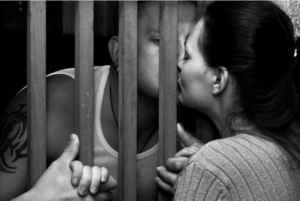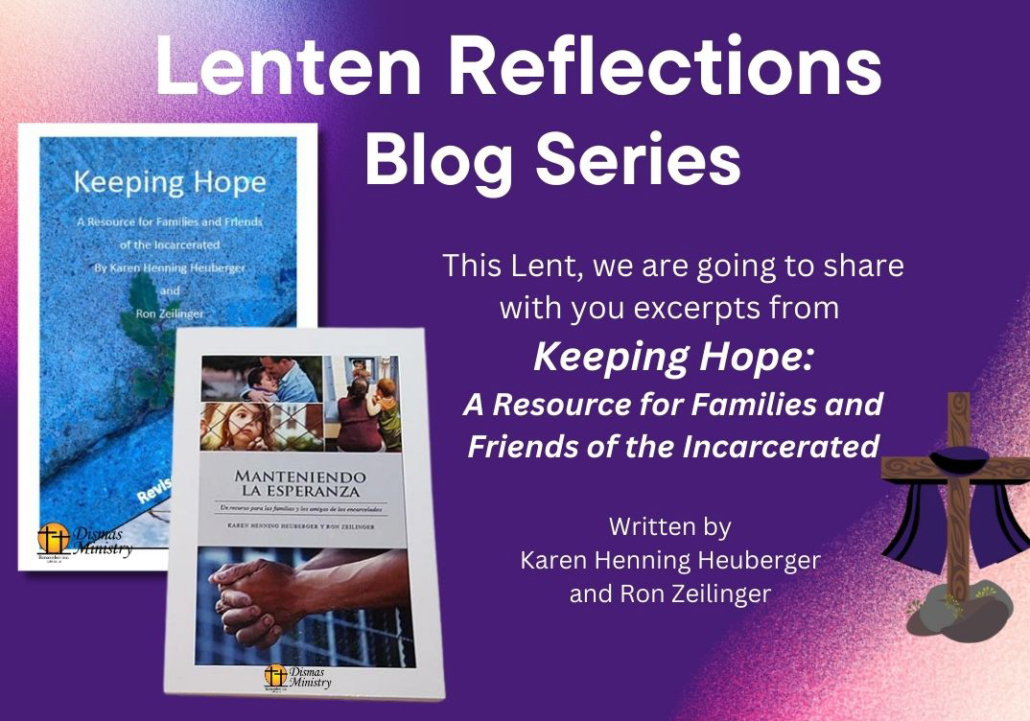This Lent, we are going to share with you excerpts from Keeping Hope: A Resource for Families and Friends of the Incarcerated
Written by Karen Henning Heuberger and Ron Zeilinger
“Facing the Challenges: Living Day-to-Day”
Whether it is a child, a spouse, or a parent, having an incarcerated family member presents many day-to-day challenges, especially if he or she was a member of your household at the time of the incarceration.
For those whose loved one was the primary source of income, the financial burdens may be the greatest source of stress. Adjusting to one income, or joining the workforce to make ends meet, may take more than creative accounting. In addition to loss of income, the person is still in your budget if you commit to continuing to care for him or her. There is the expense of phone calls, whether you pay for collect calls or put money in your loved one’s phone account.
 There is also the money that goes into his or her account for personal expenses at the prison commissary. Your loved one may need money for shoes, underwear, certain clothes, extra food, toiletries, paper and pens for classwork assignments or writing letters, and anything the prison doesn’t supply. Some have said that they budget $300 per month for the basics for their loved one.
There is also the money that goes into his or her account for personal expenses at the prison commissary. Your loved one may need money for shoes, underwear, certain clothes, extra food, toiletries, paper and pens for classwork assignments or writing letters, and anything the prison doesn’t supply. Some have said that they budget $300 per month for the basics for their loved one.
And as mentioned in Chapter Three, visiting adds even more expenses. If you travel a distance, there is the expense for gas, hotel, and food. Even if it is simply a day-trip, you will probably need to pay for food, whether in the prison or on the road.
While you may be able to support yourself and/or your family with your own job, you may not be able to live the same lifestyle you were used to before your support provider was incarcerated. You may have to make tough decisions, like not going to visit your loved one, because of the expense. You may have to move or make other big changes in your lifestyle to make ends meet. You may struggle to pay your bills and find you need to tap public resources, your place of worship, or reach out to family and friends for financial help.
 Bills that are in your name, or held jointly with the offender, will remain your responsibility. Bills in the offender’s name, such as credit card accounts, are your loved one’s responsibility, not yours. Do not be hassled by banks or lenders to pay them. The one incarcerated will have to make arrangements for those. Since he or she has no income bankruptcy is often the only solution.
Bills that are in your name, or held jointly with the offender, will remain your responsibility. Bills in the offender’s name, such as credit card accounts, are your loved one’s responsibility, not yours. Do not be hassled by banks or lenders to pay them. The one incarcerated will have to make arrangements for those. Since he or she has no income bankruptcy is often the only solution.

If you are a parent and your spouse is incarcerated, you may have to find new child care arrangements so you can work. Even if it isn’t your spouse who is incarcerated, you may find yourself taking care of your grandchildren, nieces and nephews, or other children if their imprisoned former caregiver has no one to care for these children.
Elderly grandparents can be burdened because of the energy it takes to raise young children. Or they may not be able to retire due to the expense of raising children. When you have a family of your own and are taking in the prisoner’s children, you may have to deal with how your own children will respond and how additional children in the home may affect your relationships. You will have the added expense of raising the additional children and may receive little financial support for this expense.
In addition to financial burdens are the emotional stressors. You may worry about your loved one’s well-being, whether physical, emotional, or spiritual. Even if you have a close relationship with this person, you may have weeks when you aren’t getting along, so visits and correspondence may be affected. Your emotional life may reflect that – you are up when your loved one is up, and down when that person is down.
You may also lose emotional support if people “drop out” of your life after the incarceration. Family members may respond differently to the situation and this can cause hurt and tension. Parents of inmates may blame themselves or each other, and this puts stress on their relationship. Some couples separate just to avoid having to deal with the stress. To help avoid this, couples need to realize they are still important to each other and make sure that having a child in prison is not the only focus in their lives. Supportive loved ones may also have to deal with the fact that even within the immediate family, all members may not be sympathetic to the one in prison, or even have anything to do with you or the one imprisoned. Incarceration is a trauma for so many whose lives are touched by this tragedy.
When a loved one is incarcerated, it changes family dynamics. Roles may change as a spouse becomes a “single” parent. This may be the hardest challenge of all. You lose daily emotional support and intimacy if it is your spouse who is incarcerated. Decision-making and discipline are all on your shoulders. This can lead to resentment if the prisoner, at visits, acts as if he or she is still in charge of these things.
 Children lose the daily support of a parent or significant adult as well. They may have to take on added responsibilities around the house which can result in resentment. They may feel abandoned or responsible for the incarceration and act out, either at home or at school. If any form of bullying occurs, instruct your children to report it to school authorities immediately before it escalates into violence.
Children lose the daily support of a parent or significant adult as well. They may have to take on added responsibilities around the house which can result in resentment. They may feel abandoned or responsible for the incarceration and act out, either at home or at school. If any form of bullying occurs, instruct your children to report it to school authorities immediately before it escalates into violence.
During your loved one’s incarceration, you are missing a piece of your family unit. The prisoner may miss family weddings, graduations, or funerals and other important events. Even when good things happen in your life, the incarceration is still hanging over your head, coloring the experiences of your life. You may also worry how the incarceration will affect the inmate in the long run, and may need to learn to let go of your hopes and dreams for and with that person, accepting it for what it is.
 From Those Who Know…
From Those Who Know…
I didn’t realize how much we shared around the house, like bouncing ideas off of him, or just getting a ride to get my oil changed.
I maxed out my credit cards making sure he had money on his phone account.
I had to move in with my in-laws and sell the second car.
My husband got military disability and I wasn’t sure if this would continue. I had to go through an appeal process. It was uncertain for the first several months.
I have a low-level anger toward my mom because of how she hasn’t dealt with my sister’s situation.
We almost split up.
In spite of all that happened, it was a blessing because my perspective changed. It forced me to change my priorities.

READ MORE FROM KEEPING HOPE BY PURCHASING YOUR COPY ON OUR STORE PAGE.


